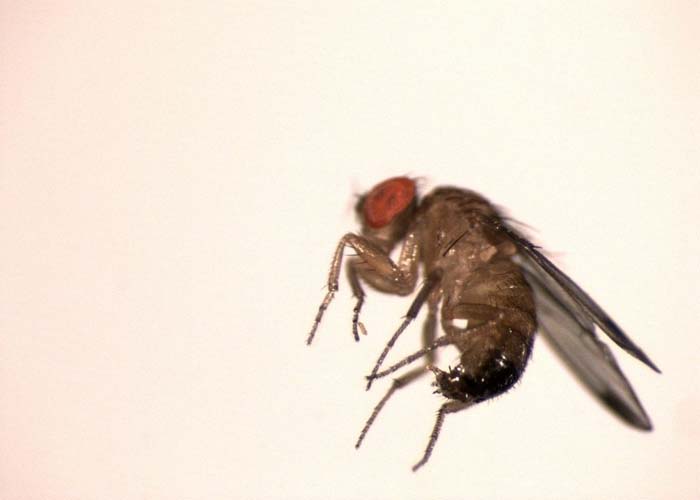
University of Leicester scientists are appealing to the public to help map out the invasion of a new pest in the UK which spoils strawberry fields.
Researchers in the University’s Department of Genetics are finding a way of halting the progress of Drosophila suzukii, an Asian fruit fly which was first spotted in the UK last year.
The fly has already spread rapidly through the USA and Italy since 2008 – and the state of California lost $300 million worth of strawberry crops the year the insect was detected.
Unlike common fruit flies which only lay eggs in rotten fruit, Drosophila suzukii is able to use its powerful saw-like ovipositor to break through the skins of ripe fruit and deposit its young inside.
The maggots then hatch, and eat through the fruit – causing it to rot.
This can spoil whole crops of soft fruits, such as strawberries, raspberries and blueberries.
At 2mm long, Drosophila suzukii are slightly larger than common fruit flies – and the males are easy to spot thanks to the dark dots on each wing.
The fly – also known as the spotted wing Drosophila – originated in south-east Asia, but was discovered in USA for the first time in 2008 and in Italy in 2009.
The fly has already had a serious economic impact – with some areas in the USA experiencing 80 per cent loss of crop yields as a result of the invasion.
The scientists are keen to find a way of preventing the same thing happening in the UK – so are hoping to find a biological solution to prevent the flies spreading further.
They plan to genetically modify male fruit flies in order to “switch off” genes which are essential for the development of the embryo into a maggot. The switch does not involve toxic substances or foreign genes. Instead, it exploits a natural process of gene regulation.
When the modified flies are released into the wild and mate with females, offspring will not develop into larvae – preventing the species from reproducing further.
The key to the system is the species-specific attraction between male and female fruit flies. In addition, the switch is designed to act on gene sequences unique to Drosophila suzukii so other organisms will not be affected by accident.
This approach removes the need to use pesticides or introduce new predators to kill the insects – both of which can have unintended consequences for other species and the environment.
They are asking for the help of budding citizen scientists to set traps for the flies around the country – so the scientists can see where the flies have already made themselves at home.
Anyone can take a recycled plastic bottle, cut small holes in the sides and put a small amount of cider vinegar into the bottle before hanging it from a tree or the fence in their garden.
Fruit flies and other insects in the area will be attracted by the vinegar, and will enter by the small holes – but will drown in the liquid at the bottom.
People can then send the liquid back to the scientists – who can check to see if any Drosophila suzukii made their way into the bottle.
This will help build up a map of where the insects are appearing around the country.
More than 50 people have already signed up to take part – with traps set in Leicestershire, Derbyshire and Yorkshire.
The scientists are hoping to get more people involved, and will have a stand at the University’s Ecology Day at the Harold Martin Botanic Garden, Oadby, on August 4.
The free day of events, supported by British Ecological Society, is open to the public, and takes place from 11am to 5pm.
The team will be on hand to talk about the invasion of Drosophila suzukii and how to spot the insects – and will hand out bottle trap kits to anyone keen to take part, and will explain how to set the traps.
The team consists of Dr Celia Hansen, Dr Özge Özkaya, Helen Roe and Dr Ezio Rosato, of the Department of Genetics.
Dr Ezio Rosato said: “Drosophila suzukii are different from the common fruit flies found in the UK. They are able to use their enormous ovipositor to break into fresh fruit and lay their eggs.
“This creates trouble. If you are a fruit grower and have little maggots growing in your fruit, it won’t be marketable. The animal has already had a huge effect on the soft fruit market in the USA and Italy.
“We want to limit the impact the animal will have in the UK. We want to develop a genetic system to control the spread of the animal – rather than relying on pesticides or introducing new predators.
“Having the public involved in this project is really useful – as it will help us have an idea of where the animal already is in the country. It is also a really good way of involving people in science – and I think people really appreciate having the chance to take part.”
